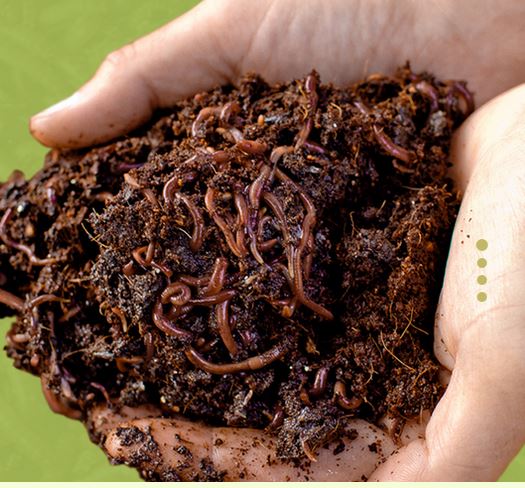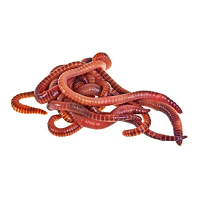Making Use Of Red Wigglers for Effective Organic Waste Disposal
The usage of red wigglers for organic waste disposal presents an engaging technique to managing food scraps while advertising environmental sustainability. These worms not just improve waste disintegration yet also produce important worm spreadings, which can substantially improve dirt health and wellness. Their ability to refine large quantities of natural material with marginal initiative placements them as an accessible option for households and communities alike. Nonetheless, understanding the subtleties of establishing a successful worm container and keeping an ideal environment is vital for maximizing their advantages. The next steps in this procedure might amaze you.
Benefits of Making Use Of Red Wigglers
One of the most compelling advantages of utilizing red wigglers for natural garbage disposal is their impressive efficiency in composting. These worms, clinically understood as Eisenia fetida, are especially adjusted for damaging down natural products, allowing them to refine waste approximately two times their body weight daily. This quick disintegration not just speeds up the composting process yet additionally generates nutrient-rich worm spreadings that dramatically boost dirt high quality.
In addition, red wigglers add to a decrease in garbage dump waste. By diverting organic materials from land fills, they aid decrease methane exhausts-- a powerful greenhouse gas. This eco-friendly benefit is important in the fight against environment adjustment.
In addition, red wigglers are low-maintenance and can prosper in different atmospheres, making them available for both beginner and experienced composters. Their capacity to recreate swiftly guarantees a stable population, promoting continuous waste processing.
Establishing Your Worm Container
Developing an efficient worm bin is essential for making the most of the benefits of composting with red wigglers. The initial step is selecting an appropriate container. A container made from plastic or wood, with a capability of 10 to 20 gallons, is optimal. Ensure the container has appropriate drain openings to avoid excess moisture, as red wigglers prosper in a damp yet not soggy setting.
As soon as the container is set up, present the red wigglers, permitting them to accommodate to their brand-new atmosphere. It's critical to monitor moisture degrees and temperature frequently. A well-maintained container will certainly not only sustain the health and wellness of the worms but also facilitate reliable decay of natural waste. By complying with these guidelines, you can develop a flourishing ecosystem that adds to lasting waste management.
What to Feed Red Wigglers
An understanding of the appropriate diet for red wigglers is important for maintaining a healthy and balanced worm populace and enhancing composting efficiency. These items not just give necessary nutrients but additionally add to the wetness balance within the worm container.
It is vital to prevent certain foods that can damage the worm populace. Red wigglers ought to not be fed meat, milk items, oily foods, or processed things, as these can draw in insects and create undesirable odors. red wigglers. Additionally, citrus fruits and zesty foods ought to be minimized, as their level of acidity can be damaging to worms
To promote optimum food digestion, food should be cut into smaller sized pieces, facilitating quicker failure and usage. Introducing food in moderation is also crucial; overfeeding can lead to anaerobic problems and attract undesirable insects. Monitoring the worm container for food intake rates will certainly help make certain that red wigglers are receiving an adequate diet while preserving an efficient composting environment. Correct feeding practices are necessary for fostering a growing environment within the worm container.
Keeping Your Worm Environment
A well-maintained worm habitat is necessary for the health and efficiency of red wigglers. To make sure optimum problems, it is crucial to keep track of temperature, wetness, and oygenation within the worm container. Red wigglers grow in a temperature variety of 55 to 77 degrees Fahrenheit. Exceeding this range can stress the worms, so it is necessary to put the bin in an ideal place far from straight sunshine and extreme temperatures.
A great rule of thumb is to keep wetness at roughly 70% to 80%. If the bedding comes to be as well damp, it can lead to anaerobic problems that are dangerous to the worms.

Utilizing Worm Spreadings in Gardening
Rich in nutrients and helpful microbes, worm spreadings act as an extraordinary organic fertilizer for gardening. Created with the gastrointestinal processes of red wigglers, these castings include a variety of necessary nutrients, consisting of nitrogen, phosphorus, and potassium, which advertise durable plant growth. Unlike artificial plant foods, worm spreadings use a slow-release device, making sure that nutrients are readily available to plants over an extensive duration, consequently reducing the risk of nutrient leaching and dirt exhaustion.
Along with nutrient web content, worm spreadings enhance soil framework and aeration, enhancing wetness retention and drainage. The microbial life existing in worm castings aids to reduce pathogens and advertises a healthy dirt ecological community, additional benefiting plant wellness. When integrated right into the soil or made use of as a top clothing, worm spreadings can considerably boost seed germination prices, origin advancement, and total plant vigor.
For optimum results, garden enthusiasts should use worm castings at a price of 1-2 inches per square foot, blending them into the dirt or incorporating them right into potting blends. In general, making use of worm castings is a green method to improving soil fertility and making sure thriving garden settings.
Final Thought

Comments on “Red wigglers: A beginner’s guide composting”